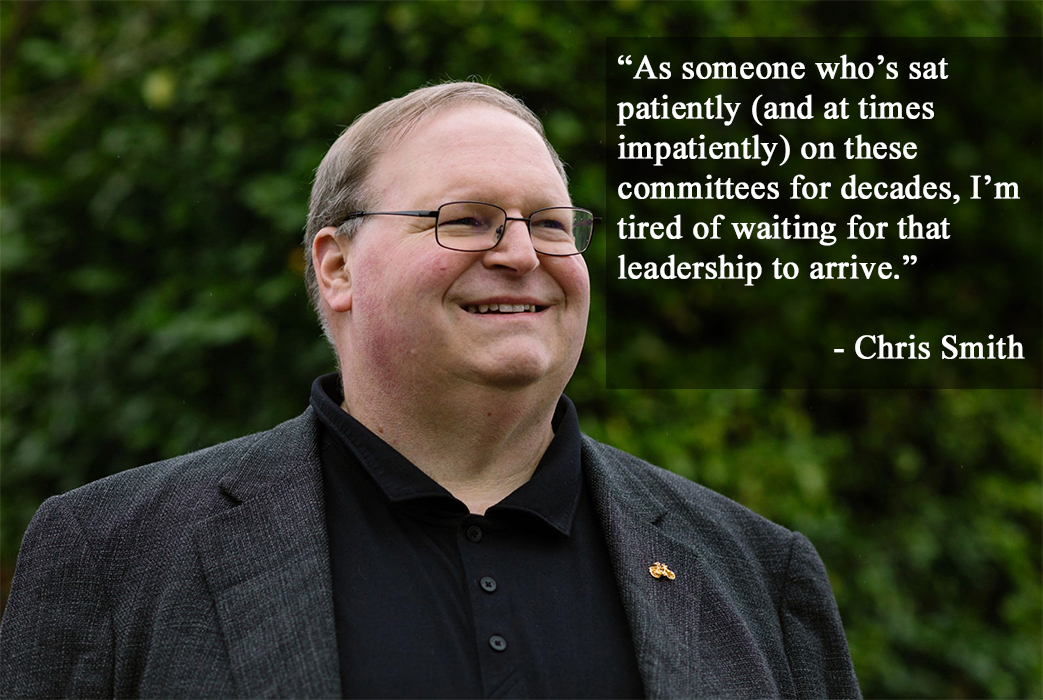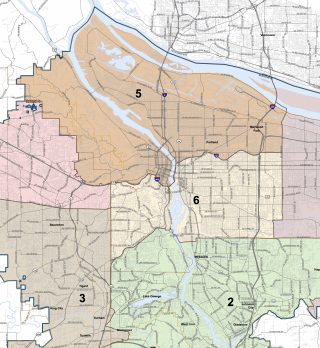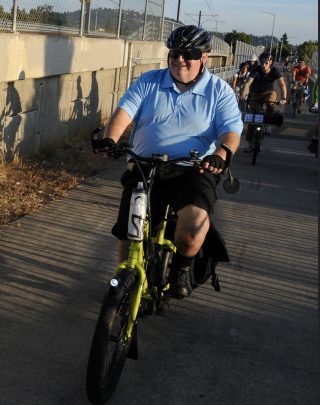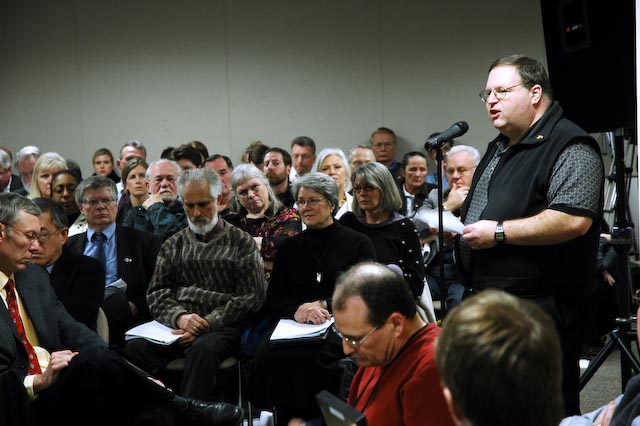

(Metro map)
It can feel awfully daunting to grapple with the numerous challenges that the Portland region is facing.
Our struggles with homelessness and housing affordability, the impending climate emergency, and rampant inequality grow more visceral and explicit with each passing year. To me these challenges are interlinked; our region needs to immediately prioritize reshaping ourselves to build as much housing as possible in dense, walkable communities connected by frequent and reliable transit to have any chance of facing these overlapping crises. Climate change is not just an existential issue but also a lens from which we can begin to address the others.
Over the last two decades, I’ve channeled my advocacy towards promoting sustainable urbanism, long before we knew just how urgent a solution prudent land-use and transportation advocacy would be for addressing the climate crisis.
“Our local government agencies need bold political leaders willing to unapologetically champion and enact the myriad of bold plans that match our aspirations and values.”
I’ve helped draft the plans and policies that can help reduce our carbon emissions while improving the quality of our lives and environment – and time and time again, I’ve watched these plans get delayed, watered down, or not even implemented. (Case in point: we’re building out Portland’s 20-year Bicycle Master Plan at a rate that will complete it in about a century!) It’s clear that our local government agencies need bold political leaders willing to unapologetically champion and enact the myriad of bold plans that match our aspirations and values. These paradigmatic shifts are necessary to stave off the worst of the climate emergency while also preparing the Portland region for our changing demographics and our ongoing housing challenge.
As someone that’s sat patiently (and at times impatiently) on these committees for decades, I’m tired of waiting for that leadership to arrive. That’s why I’m throwing my hat into the race and running for Metro Council.

(Photo © J. Maus/BikePortland)
My efforts on appointed commissions over the years have led to demonstrable victories for both housing and the environment. In 2013 I helped prevent industrial development of the last largest chunk of habitat in the region on West Hayden Island when there was no actual economic justification for it. In 2015, I helped keep Pembina’s proposed propane terminal out of our Port. And of course, there’s the ongoing battle to keep the Oregon Department of Transportation (ODOT) from spending almost a billion dollars on a freeway project that won’t make commutes any better and will double down on racist planning trespasses of a previous century.
In my decades of public service on numerous boards and committees, I’ve been fortunate to be part of remarkable initiatives that demonstrate how the right collaboration between civic stakeholders, bold leadership and effective policymakers can produce meaningful victories for equity, sustainability and justice. And yet, in my decades of public service, it’s also deeply apparent that many agencies and commissions are not only disinterested but actively hostile towards requests for transparency and accountability to a growing public interest clamoring for safer streets, climate resilience, and transportation justice.
ODOT and the Port or Portland, in particular, each with massive purse strings and political influence, seem downright unaccountable to local voters and are simply ignoring the youth climate activists pleas to step up and take on the challenges faced by our district, our region and our planet. Indeed, these agencies often seem hell bent on making things worse. ODOT and the Port of Portland keep proposing bad projects rooted in old paradigms of the fossil fuel economy.
Advertisement
“[TriMet] seems more interested in enforcing fares, hiring more cops and building heavily subsidized parking lots than proactively exploring how to make transit reliable…”
While I’ve partnered with TriMet on many occasions to improve transit service, it similarly also seems wrapped up in these twentieth-century paradigms. Listening to its leaders promoting freeway projects is maddening. But TriMet’s biggest sin is one of omission, failing to imagine the massively expanded role it must undertake to provide the region a significantly lower carbon transportation system. The agency seems more interested in enforcing fares, hiring more cops and building heavily subsidized parking lots than proactively exploring how to make transit reliable, foster affordable housing, and listen to community advocates concerned with increased law enforcement.
Metro, with the power of its own elected Council, and as the convener of elected representatives from all 24 cities and 3 counties in the region, is our best hope to refocus these agencies (whose boards are appointed by the Governor and confirmed by the State Senate) to meet the real needs of the people of our region. There’s no reason a State Senator from Southern Oregon should have more say on who makes decisions in our region than our local voters. As a Metro Councilor, I will prioritize advocating for more regional accountability of these entities, and better representation that accurately reflects the diversity of our population and urgency with which Portlanders are demanding unapologetically urgent climate action commensurate with the crisis.
But it’s not enough to stop bad projects, or use the bully pulpit of a Metro Council seat to criticize other underperforming, unaccountable entities. Metro allocates all federal transportation dollars in the region – and as the youth from Sunrise PDX continue to point out, 40% of our region’s greenhouse gas emissions come from transportation. That’s an opportunity to make the transformative investments that we will need to address not only climate, but also to invest in ways that foster equitable development strategies – our own Green New Deal for regional transportation. It’s an opportunity that, as Metro Councilor, I will seize with an urgency commensurate with the climate crisis.
Metro is also unique in its ability to raise revenue across the entire region. We’ve seen this over and over with Parks and Natural Area bonds, and recently with a Housing bond measure. This is another muscle we need to keep developing in our quest for radical modal transformation while advancing equity. Programs like Metro’s Nature in Neighborhoods must be continually supported and expanded to ensure our regional government continues to improve on its ability to serve a demographically changing region.
Advertisement
And while Metro may never be a direct housing provider, its regional revenue scope means it needs to be at the housing table, and it will need to beef up staff and policy capacity to do that. I’m looking forward to taking what I’ve learned about housing and help strengthen Metro’s capacity.
District 5 itself is a cautionary tale. So much of it is ground zero for fossil fuel sacrifice zones. From the levees on the Columbia that will be under increased pressure from high Columbia River flows, to the tank farm on the Willamette that will become a bomb when the earthquake hits. To the two freeways that border the District and the third that splits it in half, creating a cloud of benzene and other air toxics over our neighborhoods. And let’s not forget the auto scrap yards and the mountain of tires that burned in the Cully neighborhood, forcing the evacuation of low income families.

(Photo © J. Maus/BikePortland)

(Photo © J. Maus/BikePortland)
It’s time to change the paradigms; I’m ready and prepared to do it. I’ve spent the last two decades getting schooled for this role. I’ve served at Metro on TPAC and MPAC (don’t worry about the acronyms, just know that I know how Metro makes policy) and I’ve spent more than a decade on the Portland Planning and Sustainability Commission, shaping the Portland Plan, Comprehensive Plan, Climate Action Plan – diving into the details of everything from bike parking to garbage and recycling rates. And I have even more experience that you can see listed on my website.
The IPCC says we have 10 years to take 50% of the carbon out of our economy. I’m the candidate in this race who has tirelessly studied how to decarbonize our region through meaningful changes in transportation and housing policy – and worked with activists, elected officials, policymakers and everyone in between to make it happen. Metro’s a unique agency, and my decades of public service suggest I’m uniquely qualified to employ this agency in the service of our lofty sustainability and equity goals. But I can’t do it without your support. Please visit my website and make a financial contribution – of any size – if you can. You can also help by endorsing me, hosting a house party, or taking on other volunteer roles.
And I most sincerely ask for your vote on May 19.
— Chris Smith @chrisformetro on Twitter and Facebook
— Get our headlines delivered to your inbox.
— Support this independent community media outlet with a one-time contribution or monthly subscription.


